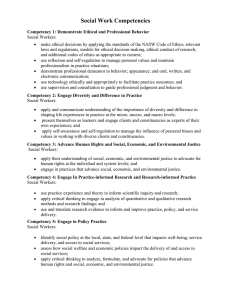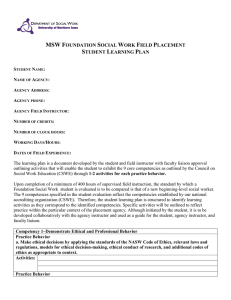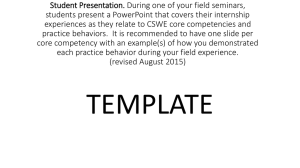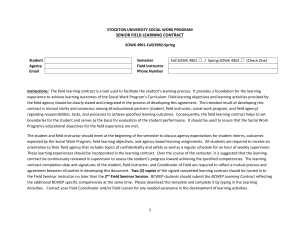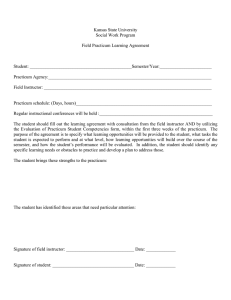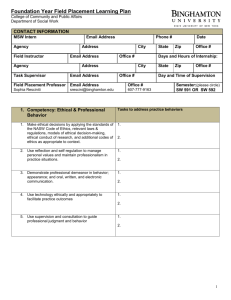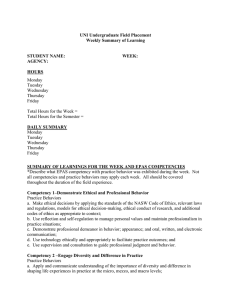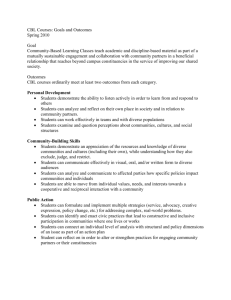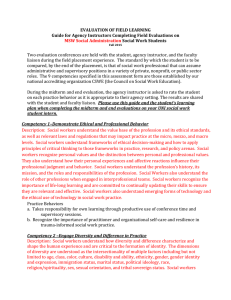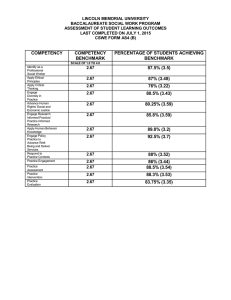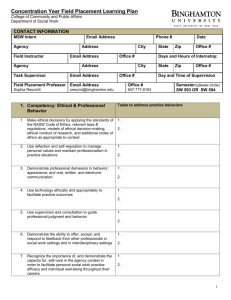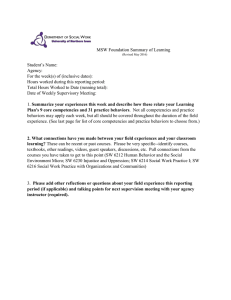MSW Foundation Summary of Learning Student’s Name: Agency:
advertisement
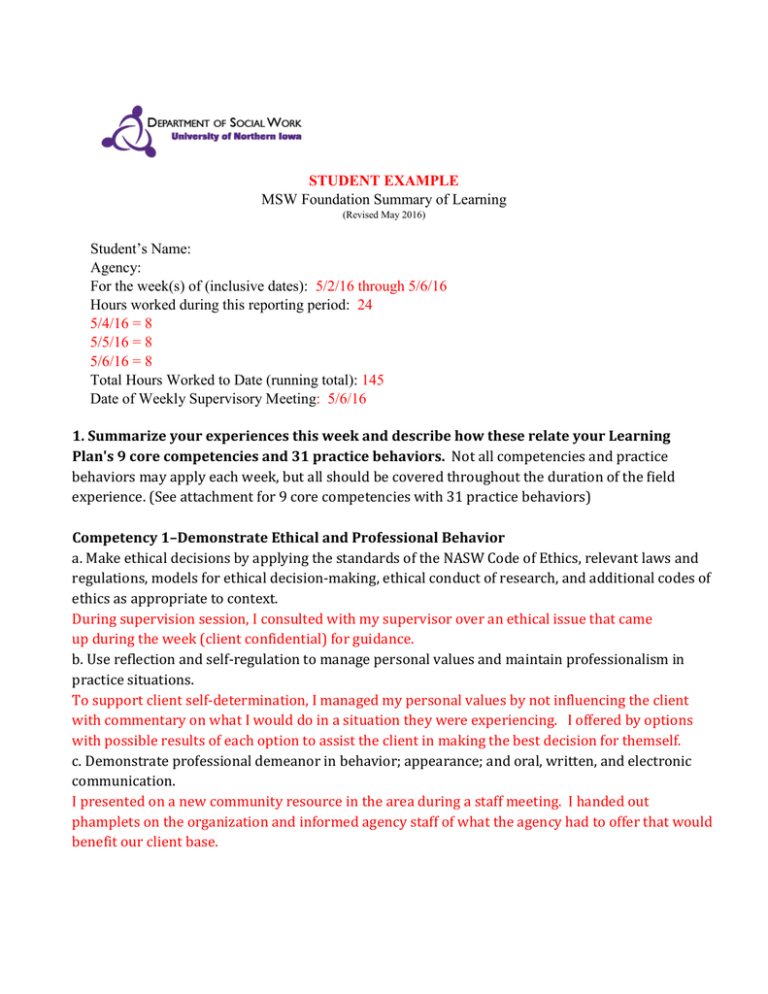
STUDENT EXAMPLE MSW Foundation Summary of Learning (Revised May 2016) Student’s Name: Agency: For the week(s) of (inclusive dates): 5/2/16 through 5/6/16 Hours worked during this reporting period: 24 5/4/16 = 8 5/5/16 = 8 5/6/16 = 8 Total Hours Worked to Date (running total): 145 Date of Weekly Supervisory Meeting: 5/6/16 1. Summarize your experiences this week and describe how these relate your Learning Plan's 9 core competencies and 31 practice behaviors. Not all competencies and practice behaviors may apply each week, but all should be covered throughout the duration of the field experience. (See attachment for 9 core competencies with 31 practice behaviors) Competency 1–Demonstrate Ethical and Professional Behavior a. Make ethical decisions by applying the standards of the NASW Code of Ethics, relevant laws and regulations, models for ethical decision-making, ethical conduct of research, and additional codes of ethics as appropriate to context. During supervision session, I consulted with my supervisor over an ethical issue that came up during the week (client confidential) for guidance. b. Use reflection and self-regulation to manage personal values and maintain professionalism in practice situations. To support client self-determination, I managed my personal values by not influencing the client with commentary on what I would do in a situation they were experiencing. I offered by options with possible results of each option to assist the client in making the best decision for themself. c. Demonstrate professional demeanor in behavior; appearance; and oral, written, and electronic communication. I presented on a new community resource in the area during a staff meeting. I handed out phamplets on the organization and informed agency staff of what the agency had to offer that would benefit our client base. Throughout the week, I emailed agency collaborators in reference to an in-service the agency is hosting. I ensured the emails were professional in presentation and included all necessary information and life links in order for individuals to register. Upon completion of a group session, I was documented in each patient chart a summary of the group session with patient response within the required 24 hours of the service. d. Use technology ethically and appropriately to facilitate practice outcomes. When emailing providers, I was sure to avoid using client identify information in my emails. e. Use supervision and consultation to guide professional judgment and behavior. Prior to sending out an agency flier for an upcoming in-service, I had my supervisor proof the document for accuracy. Competency 2– Engage Diversity and Difference in Practice a. Apply and communicate understanding of the importance of diversity and difference in shaping life experiences in practice at the micro, mezzo, and macro levels. Viewed a webinar on parenting practices with a refugee population that impacted clients seeking out appropriate health care. b. Present themselves as learners and engage clients and constituencies as experts of their own experiences. Attended an in-service on the rise of refugee populations in our area, and plan to share the findings with agency staff at the next department meeting. c. Apply self-awareness and self-regulation to manage the influence of personal biases and values in working with diverse clients and constituencies. My self-awareness was challenged this week as since I work with a population of students in one of the poorer parts of the community, I was sure they would not be bringing in valentine treats for each other. I didn't want anyone to feel left out so I brought in some for everyone. It turned out that they did bring in treats for each other. Competency 3– Advance Human Rights and Social, Economic, and Environmental Justice a. Apply their understanding of social, economic, and environmental justice to advocate for human rights at the individual and system levels. Reading up on entitlement programs and learning how it impacts client services. b. Engage in practices that advance social, economic, and environmental justice. Arranged transportation for a family to get to and from medical and therapy appointments. Competency 4– Engage In Practice-informed Research and Research-informed Practice a. Use practice experience and theory to inform scientific inquiry and research Used client outcomes data at discharge to analysis which interventions were most effective. b. Apply critical thinking to engage in analysis of quantitative and qualitative research methods and research findings. Explored 1 intervention the agency uses in a literature review. I shared the findings with my supervisor. c. Use and translate research evidence to inform and improve practice, policy, and service delivery I was able to take my recent research to inform my practice. I was more aware of patients that may be at higher risk for readmission and was more assertive and planful about getting them set up with services. Read a professional journal article relevant to the agency's client population and reflected during a supervisory session as to the best practice interventions highlighted in that article. Competency 5– Engage in Policy Practice a. Identify social policy at the local, state, and federal level that impacts well-being, service delivery, and access to social services. Learned about the NOWOAN (No One Without A Home) program and the services it provides. Attending a court hearing (initial CINA hearing) with a DHS worker. b. Assess how social welfare and economic policies impact the delivery of and access to social services. Analyzing/researching an Iowa bill recently passed that impacts service delivery at the agency level. Practice Behavior c. Apply critical thinking to analyze, formulate, and advocate for policies that advance human rights and social, economic, and environmental justice. Advocated for local funding and donations to assist with volunteer drivers for Meals on Wheels at a community event. Competency 6– Engage with Individuals, Families, Groups, Organizations, and Communities a. Apply knowledge of human behavior and the social environment, person-in-environment, and other multidisciplinary theoretical frameworks to engage with clients and constituencies. Used a genogram and an eco-map during an intake meeting with a client. b. Use empathy, reflection, and interpersonal skills to effectively engage diverse clients and constituencies. Used reflection, clarifying and reassuring skills during intake meetings with clients to ensure understanding. Competency 7– Assess Individuals, Families, Groups, Organizations, and Communities a. Collect and organize data, and apply critical thinking to interpret information from clients and constituencies. Observed the use of an agency assessment tool during intake and processed with agency staff how to correctly interpret the results of the assessment. b. Apply knowledge of human behavior and the social environment, person-in-environment, and other multidisciplinary theoretical frameworks in the analysis of assessment data from clients and constituencies. Analyzed assessment results against client needs and processed in a supervisory session any conflicts of interest. c. Develop mutually agreed-on intervention goals and objectives based on the critical assessment of strengths, needs, and challenges within clients and constituencies. Participated in a treatment planning session with a client to develop assessment and client driven treatment goals. d. Elect appropriate intervention strategies based on the assessment, research knowledge, and values and preferences of clients and constituencies. Created a hypothesis statement based on assessment results. Competency 8– Intervene with Individuals, Families, Groups, Organizations, and Communities a. Critically choose and implement interventions to achieve practice goals and enhance capacities of clients and constituencies. Observed a community coalition meeting where organizations decided on outreach efforts and information sharing to be done at an upcoming local event. Reviewed various lesson plans and positive parenting tools for upcoming parent skill development sessions. b. Apply knowledge of human behavior and the social environment, person-in-environment, and other multidisciplinary theoretical frameworks in interventions with clients and constituencies. Created a resource binder for client use of local organizations that offer services for child care, food assistance, energy assistance, housing and transportation. c. Use inter-professional collaboration as appropriate to achieve beneficial practice outcomes. Attended the weekly case consultation meeting with doctor, nurse, and family advocate to share updates on client care/progress and discuss discharge planning. d. Negotiate, mediate, and advocate with and on behalf of diverse clients and constituencies. Answered the crisis line to share community information and help problem solve with individuals who called in looking for guidance. e. Facilitate effective transitions and endings that advance mutually agreed-on goals. Attended a progress review meeting where outcome data was shared and treatment goals were reviewed (for revision or to discontinue). Competency 9– Evaluate Practice with Individuals, Families, Groups, Organizations, and Communities a. Select and use appropriate methods for evaluation of outcomes. Conducted a discharge survey with a family prior to termination of services to gain knowledge of their experience with the agency. Assisted a client with discharge paperwork. b. Apply knowledge of human behavior and the social environment, person-in-environment, and other multidisciplinary theoretical frameworks in the evaluation of outcomes. Evaluated a consumer's case notes against his treatment plan to ensure he is working towards his goal. c. Critically analyze, monitor, and evaluate intervention and program processes and outcomes. discussions during supervisory meetings and reflections on summary of learning(s). Attending an agency staff meeting where the consumer's team evaluated the past year of treatment plans with their agency mission and objectives to ensure alignment and if changes need to be made. d. Apply evaluation findings to improve practice effectiveness at the micro, mezzo, and macro levels. Summarized supervised visit for DHS worker. 2. What connections have you made between your field experiences and your classroom learning? These can be recent or past courses. Please be very specific--identify courses, textbooks, other readings, videos, guest speakers, discussions, etc. Pull connections from the courses you have taken to get to this point (SW 6212 Human Behavior and the Social Environment Micro; SW 6230 Injustice and Oppression; SW 6214 Social Work Practice I; SW 6216 Social Work Practice with Organizations and Communities) Below is a list of terms, theories, models and examples that you can use to expand upon as to the connection to field experience activities: NASW Code of Ethics Rapport Five Rules Apply knowledge of the 6 criteria of a well-defined goal. Apply knowledge of a SMART Goal. 4 Factors of Positive Client Outcomes Exploring and assessment use of phase skills Client's readiness for change Ecological System Theory Solution Focused Theory Strength based approaches Macro Social Work Theories, Models and Perspectives Community interventions (education, advocacy, direct action, direct services, self-help) Program Development Marketing and fundraising Forms of oppression and discrimination Integrated model for change Promotion of diversity Theories of person in environment Social trends Eco-maps Genogram Basic interpersonal skills Preparing skills (reviewing, exploring, consulting, arranging, empathy, self-exploration, centering, planning, recording) Beginning phase skills (introductions, initial purpose, orienting, policy issues, ethical issues, seeking feedback) Exploring phase skills (asking questions, seeking clarification, reflecting content and feelings, partializing, going beyond, reflecting hypothesis) Assessing phase skills (descriptive information, assessments) Contracting phase skills (reflecting and identifying issues, goal setting, developing a plan, actions steps, evaluation, summarizing) Working and Evaluation phase skills (rehearsing and reviewing action steps, evaluating, focusing, educating, advising, representing, responding, reframing, confronting, endings, process recordings) Ending phase skills (reviewing, evaluating, saying goodbye, recording) 3. Please add other reflections or questions about your field experience this reporting period (if applicable) and talking points for next supervision meeting with your agency instructor (required). Discuss resistive client engagement techniques Explore various self-care strategies Schedule time for crisis phone coverage Explore different types of court hearings that I can attend Share professional development opportunity that I would like to attend Review ratings and comments on midterm or final eval in preparation for liaison visit Review learning plan activities Schedule shadowing of other agency staff Prepare for community coalition meeting Schedule 1:1 sessions/group sessions for the next month
